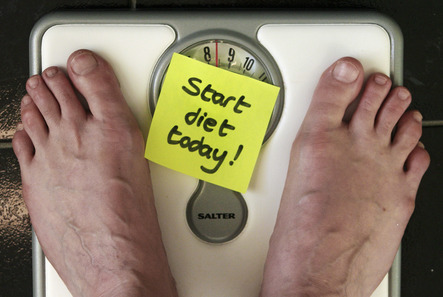How to lose weight for good

In an intriguing TED talk, neuroscientist Sandra Aamodt talks through why it can be so hard to lose weight. She first started dieting at the age of 16, and apparently 80% of 10 year old girls in the USA have been on a diet. Clearly the pressure to be slim and pretty is a strong cultural and unfortunate phenomenon. We also know that being significantly overweight leads to increased risk of serious diseases such as diabetes, cancer, heart disease and stroke.
So why is it so hard to shift those pounds? Aamodt explains that the subconscious brain is like a thermostat, keeping the body within a weight range that it considers normal. This range may be at odds with what your conscious mind desires! If your house is too hot and you open a window to cool it, the thermostat will detect the lowering of the temperature and will kick-start the heating — so the temperature rises back to where it was. The hypothalamus within the brain is just the same. If you lose a significant amount of weight the hypothalamus considers that you're starving, and this is a bad thing. So your muscles become less efficient at burning fuel — and you start to put on weight again. This is why people who lose weight have to continually eat less than people of the same weight who have always been slim. On top of this, if you gain weight and stay at that weight for a few years, your brain will start to consider this normal and you will struggle to lose that weight. It's a vicious cycle, and it feels desperately unfair.
Aamodt talks through her approach to this thorny problem: mindfulness. Your subconscious brain is in charge, regardless of what your conscious mind wants. So she recommends communicating with that subconscious, and mindful awareness appears to be one of the most effective ways of doing this. The simplest recipe for this is:
- It's okay to eat when you're hungry — how many diets say this? Not many.
- Don't eat when you're not hungry — get in tune with your feelings, and be aware of your hunger and satiety!
- Eat meals at regular times — sit at the table with friends and family, not in front of the TV!
Another very interesting finding from Aamodt's studies is that a healthy lifestyle is more likely to keep you alive, even if you don't lose weight. It's all the stuff we already know: eat plenty of fruit and vegetables, get plenty of exercise, don't smoke, drink alcohol in moderation. No surprises there.
Your osteopath may talk to you about weight-loss, particularly in relation to problems such as back pain or osteoarthritis. We know that overweight people tend to get more aches and pains, and those who manage to lose the weight report that those pains improve significantly.
It's hard to lose excess weight but it can be done. And even if you don't manage it, adopting a few healthy habits will keep you fit and happy and alive for longer!
During your appointment you're welcome to talk to me about diet and exercise advice. We can figure out what works best for you, which exercises will be feasible, and how to avoid pain while you're at it. Email [email protected] to book an appointment.